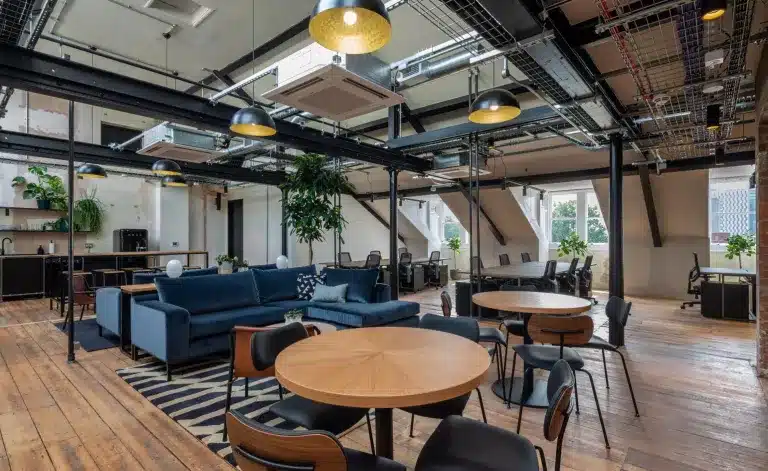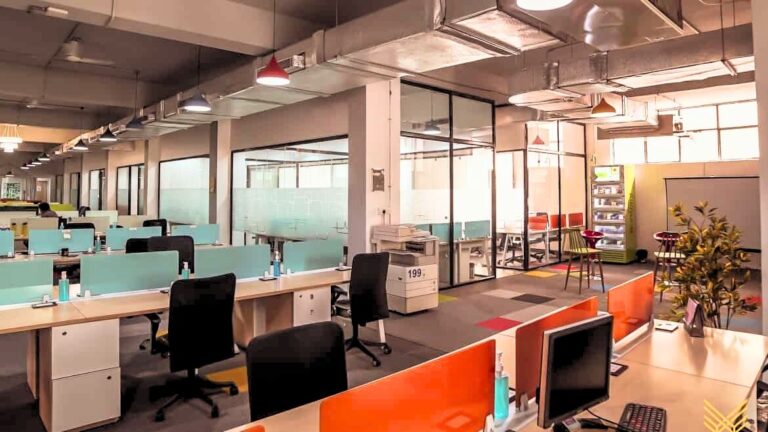Why is Coworking Space Important: Benefits for Companies and Employees
In the rapidly changing landscape of modern work, coworking spaces have emerged as a crucial solution that addresses the evolving needs of both companies and employees. As remote and hybrid work options become more prevalent, coworking spaces provide a unique blend of advantages that cater to the diverse requirements of the workforce. Let’s delve into why coworking space is important and how it is shaping the future of work.
The Importance of Coworking Spaces
The concept of co working spaces transcends mere workspace provisions. It offers a dynamic environment that fosters social interaction, networking opportunities, and a sense of community, countering the isolation often associated with remote work. As businesses grapple with the challenges posed by the traditional office model, co-working spaces emerge as a viable alternative that bridges the gap between remote work and conventional office setups.

Balancing Pros and Cons
Examining the pros and cons of co-working spaces reveals a balanced equation where the benefits far outweigh the drawbacks. Companies stand to gain substantial cost savings by opting for co-working spaces instead of investing in large office leases. On the other hand, employees relish the freedom to work in a professional setting, with the added bonus of improved networking opportunities. The diverse range of co-working spaces, from individual workstations to collaborative group areas, ensures flexibility and caters to various work preferences.
Benefits: A Win-Win for Companies and Employees
Co-working spaces offer a plethora of benefits that resonate with both companies and employees alike:
- Remote Professionalism: Co-working spaces provide employees the opportunity to work remotely in a professional and conducive environment, enhancing their productivity and focus.
- Cost-Effectiveness: For businesses, opting for co-working spaces can prove more cost-effective than traditional leases, helping to allocate resources more efficiently.
- Networking Hub: These spaces facilitate organic networking opportunities, allowing mobile workers to connect and collaborate with like-minded professionals.
- Minimal Maintenance: Co-working spaces handle facility maintenance, freeing companies from the burden of upkeep and ensuring a hassle-free experience.
- Flexibility: With pay-as-you-go and membership models, professionals can choose plans that align with their specific needs, enhancing flexibility.
- Diverse Work Settings: From private workstations to open collaborative areas, co-working spaces cater to a variety of work styles and preferences.
Drawbacks: Overcoming Challenges
While co-working spaces offer a host of advantages, certain challenges are worth noting:
- Lack of Permanence: Traditional employees might miss having a dedicated personal space, as co-working spaces emphasize flexibility over permanence.
- Privacy Concerns: The open nature of co-working spaces can sometimes lead to privacy issues and distractions, impacting concentration.
- Potential Conflicts: The presence of diverse individuals can occasionally result in personality clashes, requiring adaptability and conflict resolution skills.
- Rapid Growth Challenges: Companies experiencing rapid expansion might find the cost of scaling up in a co-working space prohibitive.
- Decentralization Issues: Managing decentralized teams working in different co-working locations could pose challenges in terms of coordination and oversight.
Paving the Way Forward: The Significance of Co-working Spaces
As the demand for flexible work environments grows and commercial real estate costs escalate, co-working spaces are poised to become even more integral. The model aligns perfectly with the evolving workforce dynamics, offering stability akin to traditional offices and the adaptability required in remote work setups. The space-as-a-service concept not only optimizes the value of physical workspace but also allows companies to focus on investing in their human capital.
Embracing Adaptability Through Co working
Adaptability has become a cornerstone trait in the modern workforce. Co-working spaces play a pivotal role in cultivating this adaptability, enabling employees to seamlessly transition between different work modes and schedules. By offering an alternative to the conventional office, co-working spaces empower employees to excel in remote, hybrid, and autonomous work scenarios.
In conclusion, the importance of co working spaces cannot be understated. As businesses and employees seek to strike a balance between flexibility and professionalism, co-working spaces provide the bridge that connects these seemingly disparate elements. With their myriad benefits, co-working spaces have emerged as a cornerstone of the future of work, shaping how, where, and when work gets done in the digital age.
Shared office space in Noida || Coworking space in Noida for a day || Temporary workspace in Noida || Workspace for a day in Noida || Flexible workspace in Noida || Shared office in Noida || coworking space Noida || Best Coworking Spaces in Noida || Private office in Noida || Best coworking space in Noida || Shared office space






